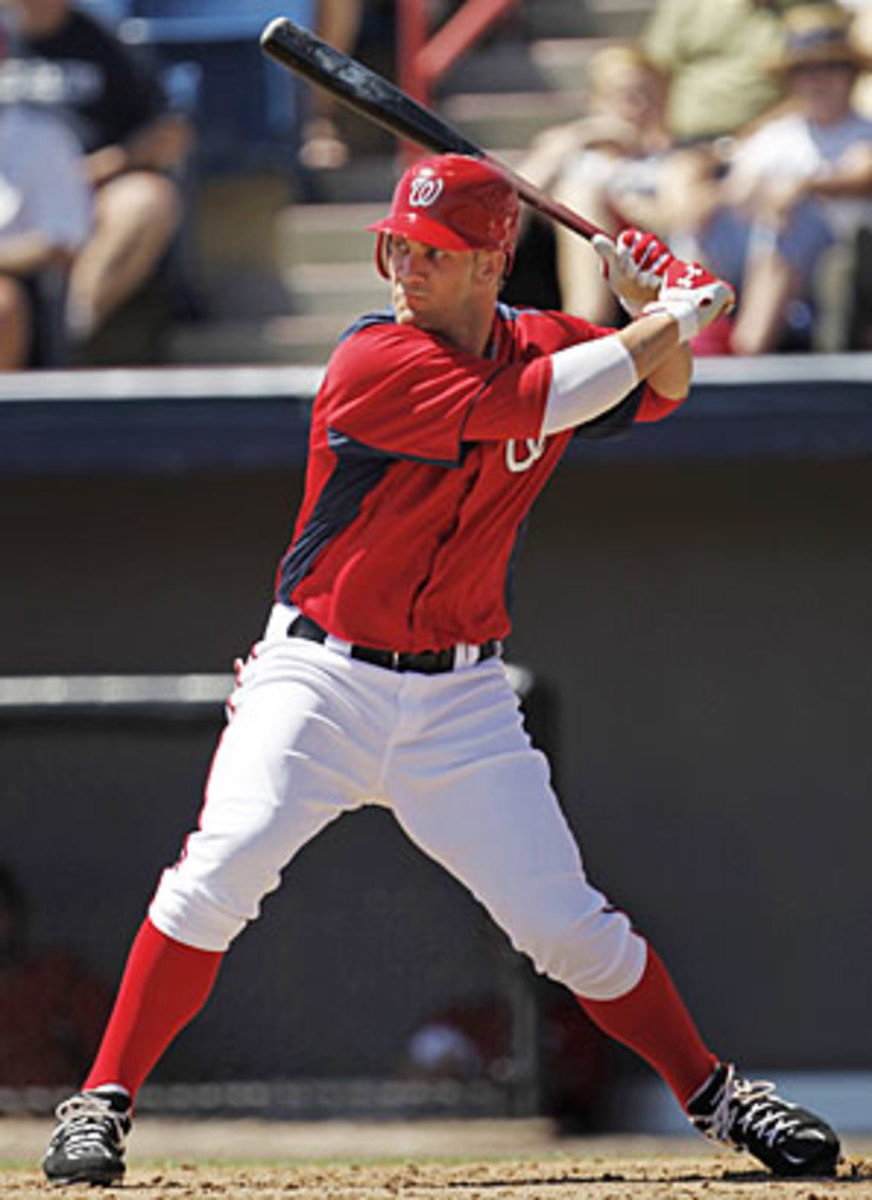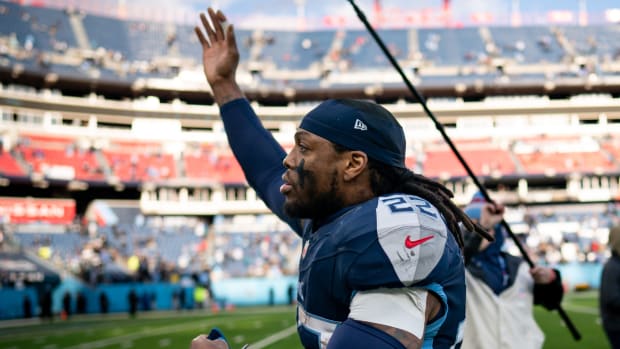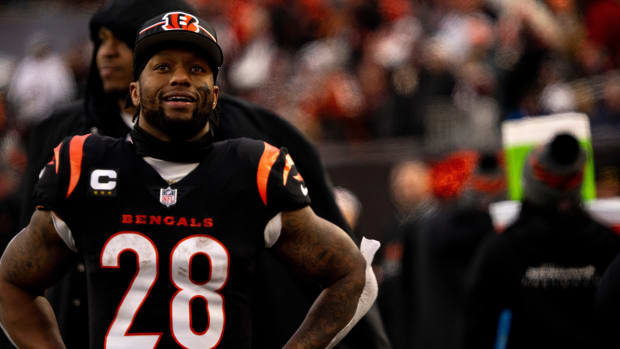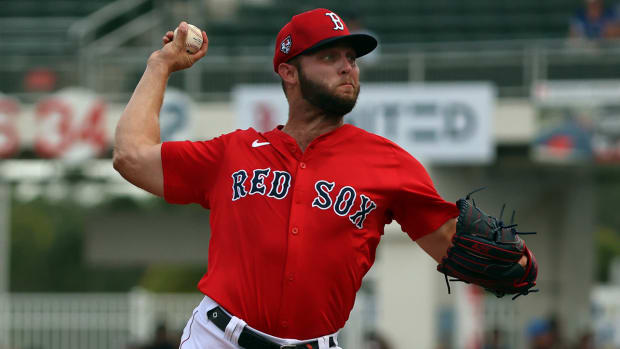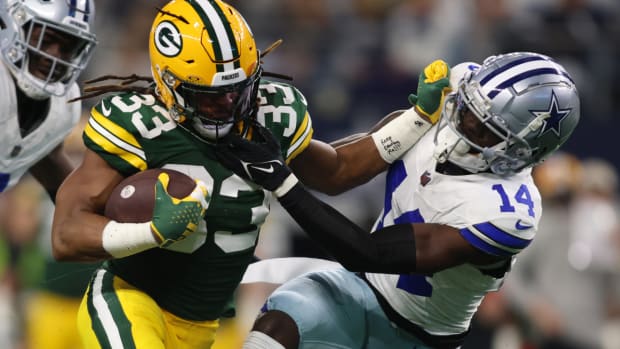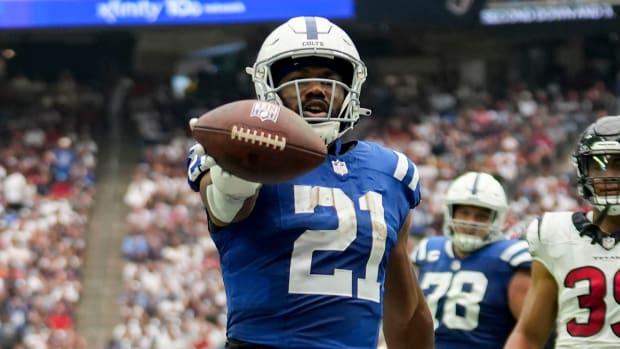Burning Questions: Can Trout, Harper avoid sophomore slump?

After suffering a summer slump last season, Bryce Harper rebounded in September, hitting .330 with seven homers and 14 RBI.
/AP
Fantasy baseball 2013 draft prep central: Rankings, position primers and much more
I learned some time ago from Rod Stewart that every picture tells a story. Don't it? Ol' Rod was still rocking in those days, and he was certainly right that every picture does tell a story. He probably didn't realize, though, that his line translates to fantasy baseball, too.
Every season tells a story, and no two stories are the same. Every year we do our best to figure out the pertinent stories beforehand, and with the right combination of skill, foresight, logic and luck, we can start putting together the pieces weeks before spring training begins. All we need to do is ask the right questions.
That's what we're going to try to do here every week with our Burning Questions series. We'll tackle some of the most vexing questions facing fantasy baseball owners as they prepare for their drafts and auctions. Any good story will throw twists at the reader, and the 2013 baseball season won't be any different. But we'll sure feel smart -- and rewarded -- if we can figure a few things out in the weeks ahead.
If you ask me, there's no better way to kick off the series than with an incisive look at two of the most exciting rookies in MLB history, Mike Trout and Bryce Harper. Harper, the National League Rookie of the Year, would have been the darling of the league in most seasons, if not for Trout, the American League's top rookie, who nearly won the MVP Award, as well. Trout and Harper have always been superlative talents, but even their most bullish supporters couldn't have expected them to shine as brightly as they did in 2012. Trout tops plenty of draft boards heading into this season, and Harper is commonly inside the top 25. But can either of these young, star outfielders possibly duplicate, or even build on, their rookie campaigns? That is this week's Burning Question.
Since Harper was constantly overlooked in favor of Trout last year, we'll throw the Nationals' wunderkind some love and talk about him first. Harper's also the more interesting case, given that even the bears on Trout will likely still have him as a top-five pick. Harper will produce a lot more debate, but count me among the sanguine. Before getting into this season, let's take a quick look at Harper's 2012 line, keeping in mind that it was his age-19 season.
Trout in 2012: 139 games, 597 plate appearances, 533 at-bats, .270/.340/.477, 22 homers, 26 doubles, nine triples, 59 RBI, 98 runs, 18-for-24 in stolen base attempts, 120/56 K/BB ratio.
PRINTABLE DRAFT KIT: Top 300 Cheat Sheet | Position Rankings Cheat Sheet
Few major leaguers have earned a full complement of at-bats during their age-19 seasons, but the ones who have are names you'll probably recognize. Mickey Mantle, Ken Griffey, Jr., Al Kaline, Robin Yount, Tony Conigliaro. Oh yeah, Ty Cobb and Mel Ott, too. Harper's 5.0 WAR at age 19 blows them all out of the water (Ott's 3.7 is second best). Using more traditional stats, Griffey hit .264/.329/.420. Mantle hit .267/.349/.443. Yount hit .267/.307/.367.
So, yeah, Harper was about as good as a 19-year-old major leaguer has ever been. That's reason No. 1 for the sanguinity.
Reason No. 2 has to do with Harper's monthly splits from a year ago. After earning a call to the majors in late April, Harper hit .271/.355/.505 in May and .274/.336/.443 in June. He fell into a prolonged slump in July, hitting .222/.306/.313 for the month, and started to come out of it in August. However, he had his best month of the year in September -- in the thick of a pennant race -- hitting .330/.400/.633 with seven homers, eight doubles and 14 RBI. Anyone bouncing back from a summer swoon while managing the natural wear and tear of a grueling baseball season is impressive. For a 19-year old to do it while getting his first run through the pressure cooker of fall baseball is an accomplishment we'll be recounting for Harper's entire career.
Nationals general manager Mike Rizzo played the central role in yet another reason for why I expect Harper to improve on his 2012 season this year. As a rookie, Harper started 86 games in center, 36 in right and six in left. The Nats put a priority on landing a center fielder and leadoff man this offseason, and Rizzo accomplished that by dealing pitching prospect Alex Meyer to the Twins for Denard Span. Not only will Span move Harper to one of the less demanding corner outfield spots (likely left, with Jayson Werth in right, even though Harper's arm is ideal for right field), but Harper likely will move down in the order, potentially into the three-hole, giving him a chance to be more of a run producer this season. He could easily break the century mark in RBI and runs.
Finally, the proof is in the advanced numbers. Harper's .310 BABIP wasn't lucky by any means, especially for a left-handed hitter with speed. His 22.5 line-drive percentage was well above league average. He had a .206 isolated slugging percentage, which had him hobnobbing with the likes of Carlos Gonzalez and Jason Heyward. He struck out 20 percent of the time and walked in just under 10 percent of his plate appearances, but both of those numbers looked prettier when he was at Double-A and Triple-A. With a year of major-league seasoning under his belt, I expect him to improve on both of those this year. Further, how many baseball players can say Senate Majority Leader Harry Reid of Nevada channeled them at a press conference?
Just one, that's how many. And I think he's set up for a 30/20 year in 2013.
Mike Trout looks at a 30/20 year, chuckles derisively, and compliments his counterpart on his nice little season. That's because as a rookie at age 20, Trout arguably was the best player in all of Major League Baseball. He hit .326/.399/.564 with 30 homers, 27 doubles, 83 RBI, 129 runs and 49 steals while being caught just five times (no truth to the rumor that the balls in play on when he was caught stealing are now enshrined in Cooperstown, although the Hall wouldn't be crazy to ask for them). When Trout got the call to the majors on April 28, the Angels were 6-14. They went 83-59 the rest of the way, good enough for the best record in baseball during that stretch. He was a unanimous choice for Rookie of the Year and was Triple Crowned out of the MVP by Miguel Cabrera. Trout was in Triple-A for most of April. By the end of May, he was superstar. The word "precocious" does not do him justice. That's Mike Trout in a nutshell. He renders certain adjectives obsolete.
Trout's '12 season will be forever remembered, but the question before us now is what to expect of him this year? I remain a steadfast soldier in the track record army, and as such, I have Ryan Braun as the top player on my board. Despite a deep pool of outfielders, however, Trout comes in right behind Braun (plus, positional scarcity is overrated, but that's a discussion for another day). Why do I like Trout so much? Well, the first reason is I have a functioning brain. But there are other, more eloquent, reasons why I believe Trout should be one of the first two names called at any draft.
Just like with Harper, Trout's monthly splits give us a more accurate look at his numbers than just looking at his season totals.
May: .324/.385/.556, five homers, 16 RBI, eight steals June: .372/.419/.531, three homers, 16 RBI, 14 steals July: .392/.455/.804, 10 homers, 23 RBI, nine steals August: .284/.366/.500, seven homers, 19 RBI, 11 steals September: .289/.400/.500, five homers, nine RBI, seven steals
Yes, Trout's pace slowed a tad after that ridiculous July, but I think there are plenty of players in the league who would be OK if their two best months of the season resembled Trout's August and September. More important, for a 20-year old getting his first dose of significant playing time in the majors, there was never a time when he looked overmatched. The consistency of his numbers from month to month speaks to that fact. That leaves us no reason to believe a sophomore swoon might be on the horizon.
Let's stick with Trout's splits for a second, moving over to the discrepancies in his home and road stats. Put simply, there aren't any. That's remarkable, given that Angel Stadium played as the fourth-least friendly run-scoring stadium in the majors, according to park factors. The stadium also saw just 0.759 homers per game, the sixth-lowest average in the league. Still, Trout raked just as effectively at home as he did on the road.
Home: .318/.390/.586, 16 homers, 14 doubles, 39 RBI Road: .332/.407/.544, 14 homers, 13 doubles, 44 RBI
Second, recall a few paragraphs back I mentioned Trout spent the first month of the season at Triple-A Salt Lake. That means he should have about an additional 120 plate appearances this season, assuming he stays healthy. Extrapolate Trout's 2012 numbers over a full season, and he's good for 35 homers, 57 steals, 97 RBI and 140 runs. That might be a simplistic calculation and it may be unrealistic to expect Trout to sustain that pace for 162 games, but 35/55 is well within the realm of possibility.
On its face, Trout's .383 BABIP suggests a high degree of luck. But then consider the talent involved. We're talking about a guy with 50-steal speed. He's probably going to leg out more than his fair share of infield hits. That checks out with his 11.8 infield-hit percentage, good for fifth in the league. Toss in his 22.6 line-drive percentage, and it becomes easy to see why Trout posted such a high BABIP. He also popped out in 4.3 percent of his at-bats, less than half the league average. And when he did put the ball in the air, it left the yard 21.6 percent of the time. This is a guy who uses his tools to the fullest.
Of course, even the best individual players need some support around them to take off to fantasy stardom. Trout is likely to hit second in the Angels' lineup, and while that's not necessarily an ideal spot for run production, he has an impressive trio of hitters protecting him in Albert Pujols, Josh Hamilton and Mark Trumbo. No one wants to give in to Trout, but even fewer pitchers want to put him on in front of those three. Trout will probably have the most askew relationship of ability to intentional walks in the league this year. That's good news for his fantasy owners.
We've seen notable sophomore slumps recently from Troy Tulowitzki and Jason Heyward. Carlos Beltran went on to be one of the best players of his era, but struggled mightily during his second season in the majors back in 2000. But we've never seen a player quite like Mike Trout.
More Burning Questions: ? Part I: Can Trout, Harper avoid sophomore slump? ? Part II: Will R.A. Dickey regress after Cy Young? ? Part III: Is Anthony Rizzo an elite first baseman? ? Part IV: Can Brett Lawrie reach his potential? ? Part V: How will the Upton brothers fare in Atlanta? ? Part VI: Is Atlanta's Kris Medlen a top-tier starter? ? Part VII: Is Kansas City's Eric Hosmer worth the wait? ? Part VIII: Can Wil Myers be MLB's next rookie sensation? ? Part IX: Are hitters still more valuable than pitchers? ? Part X: Predictions for the 2013 MLB season
































